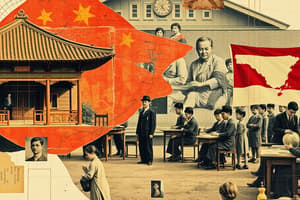Podcast
Questions and Answers
What is one primary goal of teacher training and professional development?
What is one primary goal of teacher training and professional development?
- To increase technology integration in classrooms
- To enhance student grading systems
- To implement standardized testing
- To prepare educators for effective knowledge transmission (correct)
Which factor is least likely to influence educational outcomes?
Which factor is least likely to influence educational outcomes?
- Favorite Color (correct)
- Socioeconomic Status
- Cultural Background
- Geographic Location
What is a key component of educational equity and access?
What is a key component of educational equity and access?
- Varying curriculum based on ability
- Increased competition among schools
- Equal access to educational resources (correct)
- Standardized testing for all students
What role does educational technology play in learning environments?
What role does educational technology play in learning environments?
Which influence is associated with individual learning styles?
Which influence is associated with individual learning styles?
What characterized the emergence of formal education systems in ancient civilizations?
What characterized the emergence of formal education systems in ancient civilizations?
Which of the following is NOT a key function of education?
Which of the following is NOT a key function of education?
During which period did humanity experience a renewal of learning that influenced educational approaches?
During which period did humanity experience a renewal of learning that influenced educational approaches?
What type of education takes place outside formal settings without specific educational credentials?
What type of education takes place outside formal settings without specific educational credentials?
What was a significant impact of the Industrial Revolution on education?
What was a significant impact of the Industrial Revolution on education?
Which aspect of education involves designing and implementing courses of study?
Which aspect of education involves designing and implementing courses of study?
Which educational approach is characterized by structured learning but outside formal settings?
Which educational approach is characterized by structured learning but outside formal settings?
What aspect of education is crucial for promoting problem-solving skills and critical thinking?
What aspect of education is crucial for promoting problem-solving skills and critical thinking?
Flashcards
Educational Equity
Educational Equity
Ensuring equal educational opportunities for all, regardless of background.
Socioeconomic Status
Socioeconomic Status
A person's income, housing, and family education level affecting their learning.
Learning Environment
Learning Environment
The conditions that affect student learning, including classroom environment and teacher-student relations.
Assessment Methods
Assessment Methods
Signup and view all the flashcards
Educational Technology
Educational Technology
Signup and view all the flashcards
Informal Education
Informal Education
Signup and view all the flashcards
Formal Education
Formal Education
Signup and view all the flashcards
Socialization (in Education)
Socialization (in Education)
Signup and view all the flashcards
Social Mobility
Social Mobility
Signup and view all the flashcards
Curriculum Development
Curriculum Development
Signup and view all the flashcards
Instructional Strategies
Instructional Strategies
Signup and view all the flashcards
Non-Formal Education
Non-Formal Education
Signup and view all the flashcards
Economic Development (Education)
Economic Development (Education)
Signup and view all the flashcards
Study Notes
Historical Development of Education Systems
- Early forms of education were often informal, transmitted through families and communities.
- Formal systems emerged gradually with the development of civilizations, often linked to religious or cultural institutions.
- Ancient Greece and Rome established some of the earliest structured educational systems, focusing on rhetoric, philosophy, and the arts.
- The medieval period saw the rise of monastic and cathedral schools, preserving knowledge and fostering literacy.
- The Renaissance marked a renewal of learning and a shift towards humanist approaches to education.
- The Industrial Revolution led to a demand for a more standardized and practical form of education, contributing to the development of mass education systems.
- 20th and 21st-century education has been characterized by evolving pedagogical approaches, technological advancements, and a focus on inclusivity and critical thinking.
Key Functions of Education
- Socialization: Education transmits cultural norms, values, and expectations to individuals.
- Social Mobility: Education can provide opportunities for individuals to improve their socioeconomic status.
- Economic Development: Education equips individuals with the skills and knowledge needed for the workforce, fostering economic growth.
- Personal Development: Education promotes critical thinking, problem-solving, and personal growth.
- Civic Engagement: Education cultivates responsible citizenship, contributing to a well-functioning democracy.
Educational Systems
- Formal Education: Structured learning within institutions such as schools, colleges, and universities, characterized by a curriculum, teacher-student interaction, and assessment.
- Informal Education: Learning that occurs outside of formal settings, like community programs, libraries, museums, or through personal experiences.
- Non-Formal Education: Structured learning outside of formal settings, often with a specific goal or outcome, such as professional training programs or language courses.
Key Aspects of Education
- Curriculum Development: Designing and implementing courses of study aligned with educational objectives. This process often includes balancing traditional knowledge with contemporary concerns.
- Instructional Strategies: Creating and applying effective methods to engage students and facilitate learning.
- Assessment Methods: Evaluating student learning, which varies from standardized tests to project-based assessments.
- Teacher Training and Professional Development: Preparing educators to effectively transmit knowledge, foster critical thought, and engage students with complex ideas. This involves ongoing improvement in teaching techniques.
- Educational Equity and Access: Ensuring that all individuals, regardless of background, have equal access to educational opportunities. This includes addressing issues of discrimination and ensuring appropriate resources are available.
- Educational Technology: The use of technology in education systems to improve teaching and learning, fostering inclusivity, and promoting accessibility.
Factors Influencing Educational Outcomes
- Socioeconomic Status: Factors like income, housing, and parental education can greatly influence student achievement.
- Cultural Background: Cultural differences and sensitivities can shape experiences and educational engagement.
- Geographic Location: Rural, urban, affluent, or impoverished districts often have varied infrastructure, resources, and educational opportunities.
- Learning Environments: Creating conducive learning environments. Factors such as physical infrastructure, school climate, and relationships between students and staff heavily influence outcomes.
- Policies and Funding: Government policies and funding levels impact resourcing, curriculum, and teacher training.
- Individual Learning Styles: Effective educators adapt their teaching styles to accommodate diverse learning preferences.
Studying That Suits You
Use AI to generate personalized quizzes and flashcards to suit your learning preferences.




